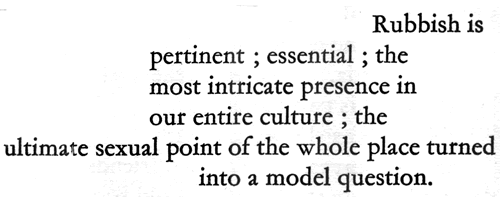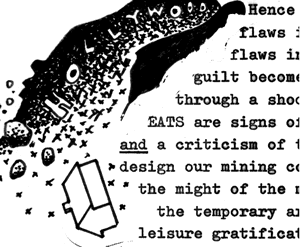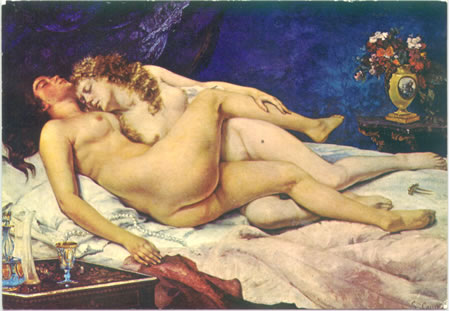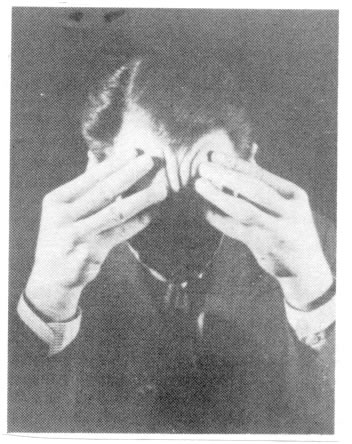
OUT TO LUNCH ON 200 MOTELS
an essay for Society Pages (the Norwegian FZ fanzine)
no 11 July 1982

J. H. Prynne Brass (1971)
In writing on Shut Up 'n Play Yer Guitar I've already argued that Zappa is at his most original and interesting when he's not blithely show-casing his considerable talents as composer, arranger, producer and guitarist (Willie The Pimp),but when he chucks it all away (A Little Green Rosetta).



THERE IS PERHAPS NO SINGLE FACTOR WHICH DISTINGUISHES SCHOENBERG SO BASICALLY FROM ALL OTHER COMPOSERS AS HIS ABILITY TO DISCARD AND REJECT ALL HE HAS PREVIOUSLY POSESSED (Theodor Adorno, The Philosophy of Modern Music, p. l22).
Zappa is aware that all sound is sociology: everything we hear has become totally humanized, hums with the grand (class) conflicts of the epoch. All human products are charged with meaning: meaninglessness is hence strictly impossible; significations will swurl and flicker whatever our attempts to limit the ferment - from Zen to Alcohol negation falls short. It follows from this short person dilemma that RUBBISH must occupy a paradoxical position. Rubbish is value denied, it is rendered universally meaningless, but since this is impossible, its meaning returns in an INVERTED or REPRESSED form to haunt us in disguise, in the form of daydreams, faint odours, noxious pollution. The readers of Society Pages will I am afraid be the last to confess what everyone else acknowledges: namely that 200 MOTELS is a load of RUBBISH.

With the pungency of a putrid pizza and the cantankerous contiguity of a crumpled coca-cola can in your back yard, 200 MOTELS boggles the mind, a concentration at once fetid and prismatic of the problems of the age, a wince-worthy whirlpool of closeted desires, flush with queasy nuggets of totemic sexuality. How this obviously cheap and indulgent concoction can prompt a Special Issue on the part of the aforementioned Socxiety Pages (thus engaging the passionate attentions of all addicts of The Big Note) presents indeed a Model Question.



200 MOTELS was - quite literally - a cheap film. United Artists supplied a budget of £200,000 and it was shot at Pinewood Studios in 5 days after only 5 days rehearsal. It was filmed on 4 simultaneously running video-cameras. One third of the 320 page script was never shot: but this didn't deter Zappa from putting out what did get done in the 5 days. This attitude towards the integrity of the art object is well illustrated by the quote in the top right hand corner, which succinctly lays down the parameters of Zappa's output macrostructure: Interviewer: Mr Zappa, is it possible to be free? FZ: Well, at least you can be cheap. There's no attempt to disguise the cheapness of 200 MOTELS: it's quite clear for instance that the entire film's shot in the same warehouse, the sets are deliberately fake. Props are reminiscent of Claes Oldenburg's Store Days, when the Pop Artist set up 'shop' in an art gallery and sold papiermaché brooms and mops (but did the mob turn round 'n bite him? ... no chance. It can't happen here... Brixton maybe, or Chapeltown), paint-splashed phones and burgers. You get the feeling that the collapse of every bit of scenery is imminent, the waking quakery of of the dream landscape in fact, the disturbing erotic quiver which shatters the object of guiltless contemplation.
From this epoch spring the arcades and the interiors,
the exhibition halls and the dioramas. They are the residues of a dream world.
The utilisation of dream elements in waking is the textbook example of dialectical
thought. Hence dialectical thought is the organ of historical awkening. Every
epoch not only dreams the next, but while dreaming impels it towards wakefulness.
It bears its end within itself, and reveals it- as Hegel already recognised
- by ruse. With the upheaval of the market economy, we begin to recognise the
monuments of the bourgeoisie as ruins even before they have crumbled.
WALTER BENJAMIN Charles Baudelaire, a Lyric Poet in the Era of High Capitalism,
p. 176
YOU GOTTA WADE THROUGH PILES OF SHIT TO GET TO PARADISE
(Geronimo Black)

Zappa's particular skill: to encourage real flaws in the technical illusion, extend them into flaws in the real world, so that the fault and the guilt become seamless, a seemless presentation of reality through a shoddy shambles. The wobbling walls of REDNECK EATS are signs of insufficient budgeting from United Artists and a criticism of the pennypinching functionalism of those who design our mining community's facilities: the contrast between the might of the machinery that digs profit out the earth and of the temporary arrangements that provide accomodation and leisure gratification for people - who are after all temporary arrangements too (as my Dad used to say) compared to the timeless accumulation of Capital that insists on mass unemployment, baby murders in Iran, the looking up of Poles.
Zappa was particularly excited with a new technique that enabled him to make moulds of real objects and reproduce them using some resinous matrix. This fascination with duplication extends to the protagonists as well: we get, for instance, Zappa himself (well, briefly: playing guitar like a jackass on Magic Fingers; grinning as Howard describes how he wants to 'wee wee in your hair' and finally staring at the camera in the grand chaotic finale - brown eyes don't make it/so what is the meaning of this?), Ringo Starr dressed up to look like Zappa and a Zappa dummy; we get the two groupies, Flo & Eddie dressed up to look like them and two dummies - at one point (during Daddy, Daddy, Daddy) we see both sets of replicas sway together (a remarkable prediction of the Really Saying Something Bannanarama/Fun Boy Three video).

"that which withers in the age of mechanical reproduction is the aura of the work of art"
"the technique of reproduction detaches the object from the domain of tradition"
"the instant the criterion of authenticity ceases to be applicable to artistic production, the total function of art is reversed. Instead of being based on ritual, it begins to be based on another practice - politics."
Walter Benjamin 'The Work of Art in the Age Mechanical Reproduction' (1936)
One of Zappa's favorite artists is Brittini (a sample of whose work is displayed over the bed on the cover of Overnite Sensation). Brittini's prints appear on the walls of motel rooms throughout America. He paints trompe-l'oeil pictures of Venetian blinds to give closed off rooms a sense of fresh air (as this page is aerated by pretty girl pneumatics): a model of the trumpery production under capitalist relations entails.
"The satire-collage is the form taken by artificial epic in the degraded world of commodity production and of the mass media: it is artificial epic whose raw materials have become spurious and inauthentic, monumental gesture replaced by the cultural junk of industrial capitalism. So it is that the most authentic realization of the epic voice in modern times - an ideal of many centuries of western culture - yields not some decorative and beautiful pastiche, but the most jarring and energetic mimesis of the mechanical, and breathes a passionate revulsion for the standardized manipulations of contemporary existence." Frederic Jameson - 'Wyndham Lewis As Futurist' in the Hudson Review 1973/4 page 325


200 MOTELS is dream; it is also artificial-epic/satire-collage; and on top of that it is also that ever recurring horror at the heart of the modern imagination, the concentration camp. As Maggie Thatcher and her right-wing cabinet win the British electorate to her unpopular policies by sinking ships full of Argentinian teenagers, all the while denouncing the enemy as a Fascist junta, it's as well to remember that credit for creating this piquant little hell on earth must go to the British: the first concentration camps were set up by Her Majesty's Army in South Africa during the Boer War. Perhaps that's why Zappa chose to film 200 MOTELS in England. The concentration camp is the final solution to the main problem of the present-day world system - ie, people. Used most notoriously in the Nazis' massacre of Jews, Socialists, Gays, Adherents of Wilhelm Reich's Sex-Pol and Feminists, they have also been used against insurgent populations in Northern Ireland, Chile, Poland. The death camp has a relationship to rubbish: it is where power would put all who refuse its pressure. Here people become mere refuse, for ready conversion to soap and lampshades. In comparison to its horrors the world of disinterested art and beauty becomes callous rubbish. Zappa's inversion of values is necessary in an upside-down society: the revered monuments of art are so much rubbish/ rubbish is pertinent because in it we can read the social unconscious:
ALL POST-AUSCHWITZ CULTURE, INCLUDING ITS URGENT CRITIQUE, IS GARBAGE ADORNO - Negative Dialectics page 367

"Arbeit Macht Frei" was wrought in iron letters over the entrance
to the Auschwitz death camp. Zappa had "Work Liberates Us All" written
over the entrance to his disaster area.
Zappa's politics are a strange kind of pre-Marxist, post-situation materialism:
they basically define themselves in opposition to social control through ideas.
The great bogey is religion, hotly followed by Fascism and Television, its latter
day derivatives. Possible members of this current include the Marquis de Sade,
Johnny Rotten, Killing Joke (before they became a Rock Band) and Crass. Obsessed
by the religion he's rejected Zappa secularizes religious themes. In 200 MOTELS
heaven and hell are presented simultaneously and in forms which stress their
material possibility: be free to dance and sing or watch the Nazis burn your
town, innocent tomfoolery or Auschwitz. The word Auschwitz contains the German
for 'joke', 'Witz' - the Sex Pistols (like Killing Joke) stressed the proximity
of horror and fun in their slogan "Belsen Was a Gas" - predictably
misunderstood by Nazi shitheads in this country and probably, on balance, a
mistake. Social democratic imagination keeps the two poles apart, thus exorcising
and repressing the disturbing fact that under capitalism mass murder bubbles
below consciousness as a constant possibility for entry on the charts - with
a bullet. In 200 MOTELS - and, for instance in The Torture Never Stops - FZ
alerts us to these unsavoury truths. Zappa was doing the same thing when he
directed listeners to Kafka's 'In The Penal Colony' on Money. Adorno said of
Kafka that he 'sins against an ancient rule of the game by constructing an art
out of nothing but the refuse of reality' (Prisms, page 251): like Zappa and
Uncle Meat, he's another alchemist of the dustbin and scrapheap. Lest it be
thought eccentric that I use Adorno - an obscure Hegelian Marxist Frankfurter
- to explain Zappa - a popstar - I append two quotations:
collage techniques, musical density, etc. In the early fifties, Zappa, then
unknown and unnoticed, attended the "Kurse für Zeitgenössische
Musik" (Courses in Contemporary Music) in Darmstadt, Germany, wliere almost
all the composers who have so radically changed the contemporary avant-garde
music scene lectured or studied: Boulez, Stockhausen, Nono, Zimmerman, Ligeti,
Henze, Kagel, Berio.
Joachim Berendt The Jazz Book page 363
ADORNO TAUGHT MUSIC AT DARMSTADT IN THE 50s AND 60s
Gillian Rose The Melancholy Science page 110
This would mean that FZ was imbibing the principles of negative dialectics sometime between the ages of 10 and 15 - someone should ask him if Frankfurt School Crtical Theory wasn't a bit much at that age. Anyway, the Captain got it wrong: the two real people in the world weren't hamburgers, they were frankfurters.
An example of the real flaws that prise apart Zappa's oeuvre like the real
world is the moment where Flo and Eddie lead the chorus on 'Penis Dimension'.
Though they play up their embarrassment with the words, their response is recorded
as documentary, not acting. This playing up, making a virtue of necessity (the
mother of them all) is characteristic of everything in 200 MOTELS. Lack of rehearsal
was inevitable given United Artists' budget, because Time Is Money. In that
track (off Sleep Dirt) FZ questioned the so-called freedoms of the fuzztone
heavy guitar solo (freedoms highly questionable since the demise of Hendrix
- see OTL in SOCIETY PAGES no 9) by following each 'expressive' note with a
meticulously scored accompaniment by assorted percussion, All that time in the
studio, such expense: the freedoms of FZ's guitar underlined by WORK. Under
capitalism, work has to be expressed in terms of time in order to translate
it into money: any 'freedom' we possess is constrained by these limits, the
cost of production, FZ's entrepreneurial view of limits doesn't lead him to
solidarity and socialism, but it leads him to concentrate on his music's relationship
to the economic sphere (at the end of 200 MOTELS he rolls the accountant's paperwork;
the bootleg Greggery Peccary includes announcements of meal breaks) which makes
it universal - in a material, non-ideological sense, 200 MOTELS was in its production
constrained by the twin tormenting calipers of time and money, but far from
letting them pinch him, Zappa uses them to tweeze us: uses them as metaphor
for our activities ("Is this waste of time what makes a life for you?").
True imagination is indeed infinite, but it proves itself in delineating real
boundaries, not in daydreaming it's absolutely free. For the purposes of shifting
product, toy manufacturers would have the child dress dollies, but we all know
that the child strips the doll, tears it apart. Adorno approved of this impulse
in both the composer and consumer: 
Flo & Eddie's grimaces and giggles at the script have another function besides adding a 'live', 'cheap' quality: they also provide a model for the musical score as obstacle race, task master, to which resistance and mistakes appear as the voice of the unconscious. It's not just the Penguin that has to jump through a hoop of real fire, it's as though every performer is pushed through unnatural acts. To hear a horn section follow an arrangement scored from an FZ-guitar-solo transcription (eg Redunzl) is to hear a madcap chase after an impossible order, a scramble after the recreation of a once-only improvisation that is doomed to failure. Zappa has commented how he loves to hear a group of musicians desperately pursuing an eccentric melody line - he finds the inevitable inaccuracies exciting, The orchestral music of 200 MOTELS puts the entire Royal Philharmonic Orchestra in the Mothers' predicament: the radical dislocation of musicians faced with scores and duties that undermine their dignity and rationale. Jeff Simmons might have said of the LA Philharmonic "those dudes are really out of it, man. It's like working with people from another planet" (Time Magazine lst June 1970) but finally he found FZ's recreational reorientation facility harder to take than did the classical musicians, as the cartoon section of 200 MOTELS explained. Lucille Has Messed My Mind Up is a great LP, but it's dated (zap me with your hair dryer, Jeff - I'll let you feature your hurt). Zappa's music on the other hand never dates because it never commits itself to a fashionable style, locks itself into a period. It stands above and pares its nails. In this hostility to music Zappa has rediscovered an element central to his hero Stravinsky (an element which the late "neoclassical Stravinsky" also forgot):
THE MODERN ASPECT IN STRAVINSKY IS THAT ELEMENT WHICH HE HIMSELF CAN NO LONGER
BEAR: HIS AVERSION ACTUALLY TO THE TOTAL SYNTAX OF MUSIC. ALL OF HIS FOLLOWERS
- WITH THE POSSIBLE EXCEPTION OF EDGARD VARESE - ARE COMPLETELY VOID OF THIS
SENSITIVITY.
Theodor Adorno - The Philosophy of Music page 153
This 'possible exception' was the transmission link that created the presentday composer who refuses to die. Zappa's importance to western philosophy can hardly be overrated. Music is philosophy made concrete, philosophy become sensually available. Good music isn't a pleasure, it's a necessity. Zappa provides the sole link between this tradition - western classical music, in which musical composition is judged by its success in siting the correct position of subjectivity vis à vis the social totality - and Black music, in which a social process extrudes itself into aesthetic commodities. This is a fancy way of saying that Zappa represents a uniquely successful marriage of classical and pop. Mingus, for instance, falls short, because his classical input stops at the romantics (though Dolphy's solos prefigured atonality, these were lapses not statements). Anthony Braxton's dissolution of melody into rhythm and the whole range of conscious Afro-percussion - Trane, Blood Ulmer, Ornette Coleman and his Harmolodics - work in parallel to FZ's explorations (cf. Uncle Meat/Black Page no 1/BeBop Tango, not to mention the Wet T-Shirt Nite chord progression) but they don't take on the philosophical problem of the classical domination present in the relationship between conductor and orchestra.

A relationship FZ maintains for his own reasons - Captain Beefheart calling him a sexual fascist, purveyor of red-in-the-face, erection-at-all-times, nose-to-the-grindstone ethics - but this relationship allows FZ to carry through a project which is not to provide an alternative but a model (a model question) of forces operating in society. Artworks which perpetuate the social order invariably disguise its workings; the danger of alternative representations is that they can be used by affirmative thought as cosmetic daydreams, consolation for the also-rans. The trendmongers brandish Kid Creole & the Coconuts as a multiracial polysexual dance troupe - but what's the difference between this and the Black & White Minstrels, apart from the fashionable seal of approval? This hapless beast had better watch out, the furtrapper from Strictly Commercial is out and about. In 200 MOTELS Zappa doesn't appeal to the authoritarian authenticity of the symphony orchestra like Deep Purple or Andrew Lloyd Webber, he pursues its inner logic to the ultimate sexual point of absurdity and destruction.
TRUTH IS OBJECTIVE, NOT PLAUSIBLE
ADORNO - NEGATIVE DIALECTICS p41
The only previously published statement on 200 MOTELS by Out To Lunch is this: "In respect of rubbish, Zappa's 200 MOTELS does all that The Waste Land pretended to." (from Out To Lunch: 'Erogenous Sewage In The Work of Hart Crane' in HERETIC vol I no 2, [NO LONGER] available from Paul Brown, 176 Peckham Rye, London SE22 9QA, England - £2.50 including postage) I've been asked to clarify. I see The Waste Land as a shot at garbage-epic that failed because TS Eliot lacked contempt for the refuse he mucked about in: what we have is decorative pastiche and sententious pronouncement. THROUGH HOSTILITY TOWARDS ART THE WORK OF ART APPROACHES KNOWLEDGE - Adorno, The Philosophy of Music, page 124 - and TS Eliot never got near. The Waste Land cracked itself up to be a central work of high modernism, but the images aren't broken they're crazy-paved. It's become the consolatory humbug that allows America to feel profound about the atrocities committed in Vietnam (Apocalypse Now). True works of modernism resist recruitment by reactionary currents. 200 MOTELS is such an irregular, monstrous artefact; its putrescence can only be faced on its own terms, the specific materials from which it's constructed: the ideologies of heavyrock and classical music (neither of which survive), the place of the Mothers in society.
MUSIC OF THE DISRESPECTFUL ABYSS, ANTI-HUMAN RHAPSODIES OF THE WASTE PIPE AND
WATER CLOSET
NIGHTLY THE GROPING FINGERS OF THIS VULGAR INTRUDER HAVE STRUMMED THE TOPPLING
BYZANTINE ORGAN OF HIS MIND
BLACK FUGUES RESULTED - RESOUNDING DOWN THE EWIGKEIT
Wyndham Lewis - Enemy of the Stars, 1932
Like Enemy of the Stars, 200 MOTELS revolves around some hidden and hideous primal scene. When Rance asks the groupies if they will trade what lies behind the curtain for what Howard has in his pants we see a glimpse of a Nazi in uniform (well, some unfortunate symphony percussionist). This is a reference to the idea that sexual repression lies at the root of fascist psychology, the authoritarian personality. You betta know now all your education, or you'll wind up workin' in a gas station - and that's not petrol he's refering to. This is why FZ told the baby held aloft in the aisle at Hammersmith 19/2/79 to listen to the words of Dirty Love, so maybe the baby'd grow up straight:
Reich has written about the repression of sexuality in the white man, and how this blocking of natural emission and other violent energies causes cancer and madness or white Americans. And this sexual energy is a dirtiness, an ecstasy, which always threatens the "order" ie "rationalism", the a-human a-sexual social order the white man seeks with all his energies to uphold.
Leroi Jones Home, Social Essays (1968) page 233

We don't have to endorse Leroi Jones' suspect commitment to 'natural' sexuality to see that in 200 MOTELS Zappa indeed presents a load of rubbish whose intricate presence turns the ultimate sexual point - and here I am of course talking of the PENIS - into a social, and hence political question.
OUT TO LUNCH would be delighted to hear from readers of SOCIETY PAGES who have
something to say about the above, or weird discoveries or poems or tapelists
or whatever: OTL, 29 Glossop Street, Leeds 6, United Kingdom [N. B. THIS ADDRESS.
DON'T WORK ANYMORE: DROP A LINE TO info@militantesthetix.co.uk instead]